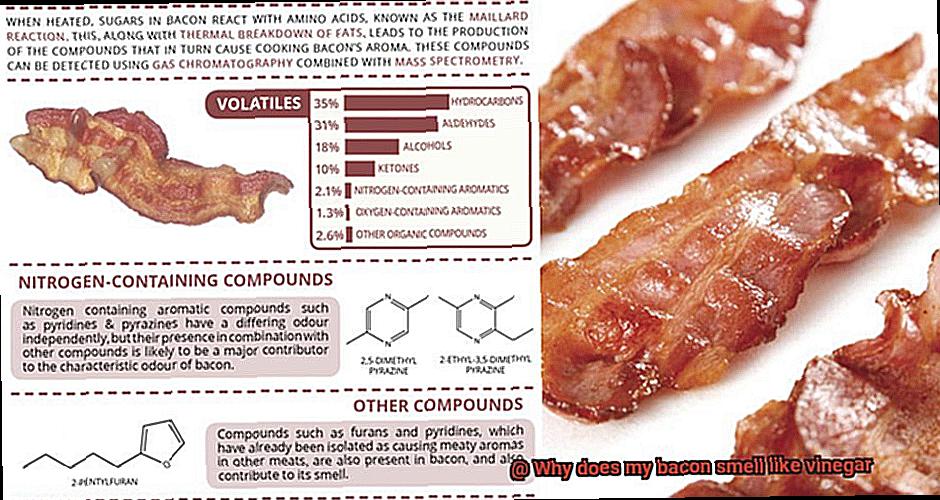Bacon, oh how we love thee. The crispy, salty, and savory meat has become a beloved ingredient in kitchens worldwide. Whether it’s wrapped around a filet mignon or nestled between two slices of bread, bacon is a versatile food that can be enjoyed at any time of the day. But what happens when you open a packet of bacon and are met with an overpowering whiff of vinegar? It can be quite alarming and leave you scratching your head, wondering why your bacon smells like vinegar.
There are several reasons why this might happen. Sometimes the vinegar smell is intentional, as some manufacturers use it as a flavoring agent during the curing process. Other times it could indicate spoilage or contamination from an old frying pan. Regardless of the cause, the scent of vinegar can be off-putting to many people.
In this article, we’ll explore the science behind why your bacon may smell like vinegar. We’ll discuss the various factors that impact its aroma and flavor, including storage conditions and processing methods. We’ll also provide tips on how to determine if your bacon is still safe to eat and how to prevent that pesky vinegar smell from ruining your breakfast experience.
So let’s dive into this delicious mystery together and uncover all there is to know about why your beloved bacon may have an unexpected vinegary kick.
Contents
What is Bacon?
Bacon is no doubt one of the most beloved foods in the world, with a rich history dating back centuries. It is a type of cured meat that comes from the belly or back of a pig and is typically sliced into thin pieces and cooked until crispy. The process of making bacon involves curing the meat with a mixture of salt, sugar, and other flavorings to help preserve it and give it a distinct flavor. After curing, the meat is usually smoked to add even more flavor.
There are many different types of bacon available on the market, ranging from regular to thick-cut, and applewood-smoked bacon to flavored options like maple or peppered bacon. Its versatility as an ingredient makes it a popular choice for breakfast, lunch, and dinner dishes. Bacon can be found in many different recipes, such as bacon and eggs, breakfast sandwiches, pancakes with bacon, BLT sandwiches, and even as a topping for pizzas and burgers.
However, have you ever noticed the strange smell that sometimes comes with bacon? A smell that resembles vinegar? The vinegar-like smell can be concerning and leave you wondering what could be causing your bacon to smell this way. There are a few reasons why this could happen:
- Curing process – During the curing process, bacteria on the meat break down the sugar and produce lactic acid. This lactic acid can give off a sour smell that resembles vinegar.
- Smoking – The type of wood used during smoking can also result in a vinegar-like smell in the bacon. Some woods produce a sweet and fruity aroma, while others produce a stronger and smokier aroma. The use of certain woods during smoking can result in a vinegar-like smell in the bacon.
- Improper storage – Lastly, improper storage of bacon can cause it to develop a vinegar-like smell. If bacon is stored in warm temperatures or exposed to air for too long, it can spoil and develop a sour smell resembling vinegar.
The Curing Process
Let’s delve deeper into one of the key ingredients in the curing process: vinegar.
In essence, curing is a preservation method that involves adding salt, nitrates, and other ingredients to meat to prevent bacterial growth and extend its shelf life. However, curing also imparts a unique flavor and texture that sets it apart from uncured meat.
Enter vinegar – a crucial ingredient in the curing process. Typically, white distilled vinegar or apple cider vinegar are used due to their acidic nature that helps prevent bacterial growth and spoilage. Vinegar not only preserves the meat but also enhances its flavor.
During the curing process, bacon is soaked in a mixture of salt, sugar, and other ingredients for several days. The addition of vinegar helps to break down the proteins in the meat, resulting in tender and flavorful bacon. However, if too much vinegar is used or if the bacon is not rinsed properly, it can result in an overpowering vinegar smell that detracts from the overall flavor.
So why is vinegar so important in the curing process? Without it, bacteria could grow and cause spoilage, rendering the bacon inedible. Furthermore, vinegar plays an integral role in giving bacon its signature taste and texture.
It’s worth noting that while a slight vinegar odor is normal in cured bacon, an overwhelming scent may indicate issues with the curing process. To ensure a perfect slice of bacon every time, proper curing techniques must be employed.
Smoking with Different Woods
The type of wood you choose for smoking your bacon is crucial. Selecting the right wood can either enhance or detract from the overall taste and smell of your bacon. For instance, hickory, mesquite, and applewood are commonly used because they provide a rich and smoky flavor that complements the meat’s natural sweetness. However, woods like oak and maple are more subtle in their flavor profile and can add a milder, sweeter taste to the bacon.

But beware, using the wrong type of wood can result in an overpowering scent that can ruin your bacon experience. For example, using too much cherrywood or alderwood can lead to a sour or vinegary aroma. To prevent this, it’s essential to choose the right type of wood and use it in moderation.
Here are some tips to help you avoid any off odors while smoking bacon:
- Choose the right type of wood – Hickory, mesquite, and applewood for a rich and smoky flavor. Oak and maple for a milder, sweeter taste.
- Use wood in moderation – Too much cherrywood or alderwood can lead to a sour or vinegary aroma.
- Cool your bacon before storing – Letting your bacon cool to room temperature before storing it in the fridge or freezer prevents condensation from forming and causing off odors.
Improper Storage of Bacon
Have you ever opened a package of bacon only to be met with a sour, vinegar-like odor? If so, then improper storage might be to blame.
It’s important to understand why this happens. Bacon is particularly susceptible to spoilage if not stored correctly, leading to that unpleasant smell. To prevent this from happening, it’s crucial to store bacon in a cool, dry place that’s away from direct sunlight and heat sources. This will help prevent the growth of bacteria that can cause spoilage.
But storage doesn’t end there. Once you’ve opened a package of bacon, you need to use it within seven days or freeze it for later use. Leaving opened bacon packages in the refrigerator for too long is one common mistake people make, leading to rancidity and an unpleasant odor.
Another mistake is storing bacon in its original packaging once it’s been opened. The packaging isn’t airtight, which can allow air in and spoil the bacon. Instead, transfer it to an airtight container or wrap it tightly with plastic wrap to keep air out.
Lastly, don’t leave your bacon in the freezer for too long. Freezer burn can occur when food is exposed to air, causing dehydration that leads to off-flavors and textures. To prevent this, wrap your bacon tightly in plastic wrap or foil before placing it in the freezer and use it within six months.
Common Causes of a Vinegar-Like Smell in Bacon
That sour odor can be off-putting, making your morning meal less enjoyable. Fear not, for there are several reasons why this might happen, and we’re here to explore them.
Firstly, let’s talk about the role bacteria can play in creating that unpleasant aroma. Lactic acid bacteria are naturally present in meat and can produce acids that give off a sour smell. When bacon is not stored properly or for too long, it can spoil and develop off-flavors and odors due to the growth of these bacteria. Proper storage is key; check the expiration date on your bacon package and store it in a cool, dry place. Transfer opened bacon to an airtight container or wrap it tightly with plastic wrap to keep air out.

But did you know that the type of wood used for smoking the bacon can also contribute to a vinegar-like smell? If the wood contains high levels of acetic acid, it can impart that sour aroma onto the bacon during smoking. Additionally, certain curing agents or additives used in processing can also contribute to off-flavors and odors.
To sum it all up, there are several potential causes of a vinegar-like smell in bacon. By understanding these common culprits and taking steps to prevent them, you can enjoy delicious, flavorful bacon without any unwanted aromas. Here’s a quick list of tips to help you avoid that sour smell:
- Store your bacon properly in a cool, dry place away from heat and sunlight.
- Check the expiration date on your package before cooking.
- Transfer opened bacon to an airtight container or wrap it tightly with plastic wrap to keep air out.
- Be aware of the type of wood used for smoking your bacon.
- Take note of any curing agents or additives used in processing.
How to Prevent a Vinegar-Like Smell in Bacon
Bacon is a breakfast staple that many people love, but it can be frustrating when it smells like vinegar. Understanding what causes this odor is key to preventing it. One of the main culprits is bacterial growth during the curing process. When bacon is cured with salt and other seasonings, it creates an environment that encourages bacterial growth. If left unchecked, the bacteria can produce acetic acid, which is the same compound that gives vinegar its distinct smell and taste.
To prevent a vinegar-like smell in your bacon, you need to take steps to ensure that it’s properly cured and stored. Here are five sub-sections to help you achieve this:
Proper Curing
When curing bacon at home, be sure to follow a trusted recipe and use high-quality ingredients. Don’t skimp on the salt or the curing time, as this can lead to bacterial growth. After curing, rinse the bacon thoroughly and pat it dry. This helps remove any excess salt or seasonings that could contribute to bacterial growth.
Storage
Once dry, store the bacon in a cool, dry place. Avoid storing it in a warm or humid environment, as this can encourage bacterial growth. Bacon should be kept in the refrigerator at all times and should be placed in an airtight container or wrapped tightly in plastic wrap or aluminum foil.
Cooking Techniques
When cooking your bacon, use medium heat to prevent excess fat and water from being released, which can lead to a vinegar-like smell. Overcooking or burning bacon can also produce acetic acid and other compounds that contribute to the odor. Cook bacon low and slow until it’s crispy but not burned.
Ingredient Choices
Avoid using acidic ingredients like lemon juice or vinegar when cooking your bacon as they can react with the bacon’s fats and create an unpleasant odor. Instead, stick to neutral ingredients like butter or oil.
Baking Soda Trick
If you’re still having trouble with a vinegar-like smell in your bacon, try adding a pinch of baking soda to the cooking water. This helps neutralize any acidic compounds and can help reduce the odor. Avoid adding too much baking soda as this can affect the flavor of the bacon.
Tips for Storing and Preparing Bacon Properly
Luckily, there are some easy tips for storing and preparing bacon that will help prevent this from happening.
Storing bacon properly is crucial to avoid any unpleasant smells or flavors. Always keep bacon in the refrigerator at 40°F or below, and leave it in its original packaging until you’re ready to use it. If you have any leftovers, wrap them tightly in plastic wrap or aluminum foil to prevent air from getting in. Additionally, avoid keeping bacon in the freezer for too long, as this can cause the fat to go rancid and develop an off-putting smell.
When it comes to cooking bacon, start with a cold pan to prevent sticking and cook until crispy. Overcooking or burning bacon can cause it to develop a bitter taste that can be mistaken for a vinegar smell. It’s also important to avoid using acidic ingredients like vinegar or lemon juice when cooking bacon. These ingredients can react with the fat in the bacon and cause an unpleasant smell. Instead, opt for neutral or slightly sweet ingredients.
Lastly, make sure to clean your cooking equipment thoroughly after cooking bacon. The grease and fat from the bacon can build up on pans and grills, leading to a lingering smell that can affect future dishes. Use hot soapy water and a scrub brush to clean your pans properly after cooking bacon.
j2LDc5J0JoY” >
Conclusion
In conclusion, bacon is a mouth-watering delicacy that has been enjoyed for centuries. However, nothing can ruin the experience of cooking bacon like an unexpected vinegar-like smell. Fortunately, there are several reasons why this may happen and ways to prevent it from happening again in the future.
To start with, curing bacon involves using high-quality ingredients and following trusted recipes. After curing, it is important to rinse the bacon thoroughly to remove any excess salt or seasonings that could contribute to bacterial growth. Proper storage is also crucial in preventing spoilage and off-flavors. Keep your bacon refrigerated at all times and transfer opened packages to an airtight container or wrap tightly with plastic wrap or aluminum foil.
When smoking bacon, choose the right type of wood for the desired flavor profile and use it in moderation to avoid overpowering aromas. Additionally, be aware of any curing agents or additives used in processing.
Cooking bacon low and slow until crispy but not burned is another way to ensure maximum enjoyment. By following these simple tips for storing and preparing bacon properly, you can indulge in this versatile meat without any unwanted aromas.
So next time you open a packet of bacon and notice an unexpected smell, don’t panic.






